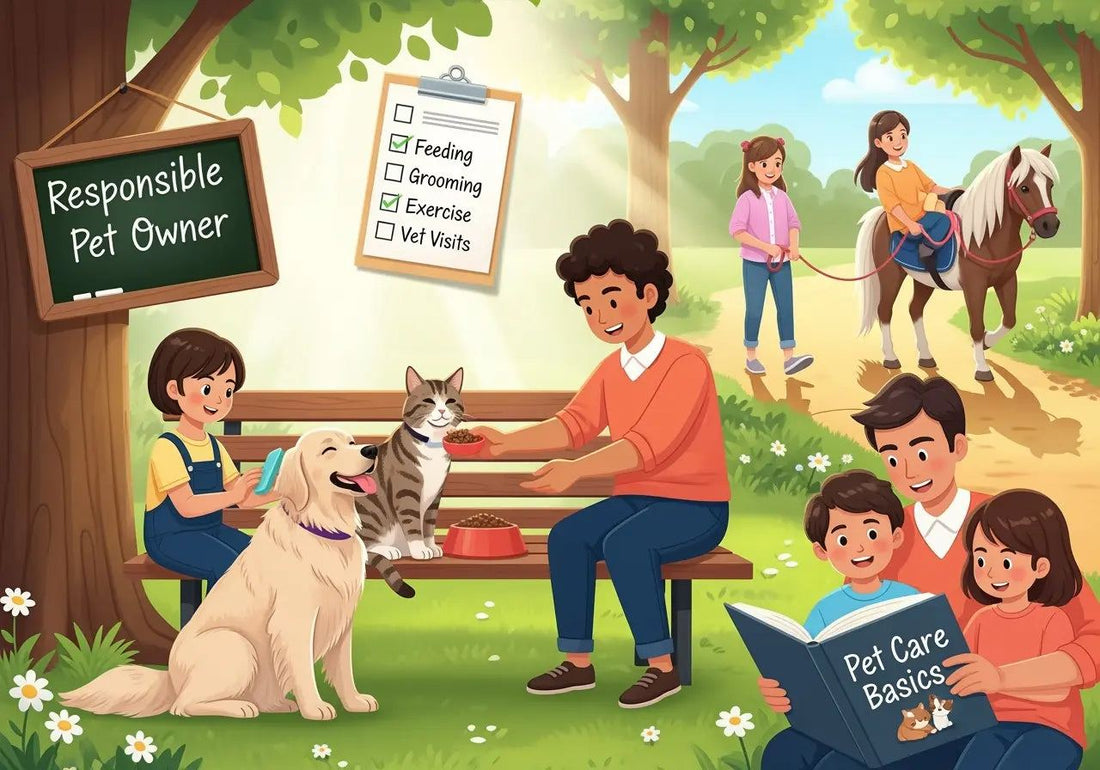
Responsible Pet Education: 10 Key Responsibilities Every Owner Must Know
Share
Understanding Responsible Pet Education
What Is Responsible Pet Education?
Responsible pet education is fundamental for any new or existing pet owner. It encompasses not just knowledge of pet care but also the emotional and social commitment necessary for a fulfilling pet-owner relationship. By engaging in a responsible pet education program, owners can ensure their pets lead healthy, happy lives. This article will outline the 10 key responsibilities every pet owner must embrace to foster a thriving relationship with their furry friends.
The Importance of Responsible Pet Ownership
Being a pet owner comes with lifelong responsibilities, including health care, nutrition, and safe living environments. These elements are crucial for ensuring that pets receive the love, care, and attention they need. Understanding your role in responsible pet education helps shape positive behavior and health outcomes for pets, ultimately benefiting society as a whole.
1. Provide Committed Care
Understanding Your Commitment
When you choose to bring a pet into your home, you're also adopting a lifelong commitment to care for that animal. This includes providing regular health checks, necessary vaccinations, and a stable, loving environment.
Key Areas of Commitment
- Time: Invest time in understanding your pet's needs.
- Financial Responsibility: Be prepared for ongoing expenses such as food, grooming, and veterinary care.
- Emotional Availability: Create a nurturing environment that supports their emotional needs.
2. Regular Veterinary Visits
The Importance of Check-Ups
Regular veterinary visits are critical to maintaining your pet's health. Just as with humans, early detection of medical issues can prevent more severe health problems down the line.
What to Expect During Visits
A typical veterinary visit may include:
- Wellness examinations
- Vaccination updates
- Advice on nutrition and exercise
- Preventive care recommendations
3. Nutrition and Diet
Tailored Nutrition
Every pet has unique dietary requirements based on age, size, and health conditions. Consult with your veterinarian to create a balanced and nutritious diet plan tailored specifically for your pet.
Signs of Proper Nutrition
Healthy pets will display:
- Shiny, strong coat
- Good energy levels
- Normal weight
- Healthy stool
4. Training and Socialization
The Role of Training
Training is integral to responsible pet education. It sets the foundation for your pet's behavior and social skills, which can prevent behavioral issues in the future.
Socialization Tips
To effectively socialize your pet:
- Introduce them to various environments
- Meet different people and pets
- Encourage positive interactions
5. Safe Environment
Creating a Pet-Friendly Home
A safe environment protects your pet from injuries and health hazards. Pet-proofing your home includes removing toxic plants, securing cords, and ensuring all pet supplies are safely stored.
Outdoor Safety Measures
When outside, ensure your pet is:
- Leashed or safely enclosed in a yard
- Accompanied during walks
- Supervised around other animals
6. Regular Exercise
Benefits of Physical Activity
Just like humans, pets need regular physical activity to maintain their health and happiness. Exercise helps avoid obesity, reduces anxiety, and strengthens the bond between you and your pet.
Exercise Activities
Consider these activities:
- Daily walks
- Playtime with toys
- Scheduled trips to a dog park
7. Grooming Needs
Why Grooming is Important
Regular grooming is an essential part of responsible pet ownership. It keeps your pet looking good and allows for checks of their skin and coat for signs of health issues.
Grooming Tasks
Essential grooming tasks include:
- Brushing their coat
- Trimming nails
- Cleaning ears
8. Emergency Preparedness
Planning for the Unexpected
Every pet owner should have a plan for emergencies. This includes identifying local pet-friendly shelters and keeping an emergency kit filled with supplies.
Emergency Kit Essentials
Your emergency kit should contain:
- First aid supplies
- Current medical records
- Food and water
9. Behavioral Management
Understanding Behavioral Issues
Understanding your pet’s behavior is essential in providing appropriate care and training. This can help to manage issues such as anxiety or aggression.
Professional Help
If behavioral issues arise, consult with a professional trainer or veterinarian who specializes in behavior.
10. Lifelong Commitment to Education
Continuous Learning
Responsible pet education is an ongoing journey. Stay updated with new knowledge, techniques, and services available for your pet, including advances in veterinary care.
Resources for Pet Education
Explore resources such as:
- Veterinary websites
- Pet training workshops
- Local pet care classes
In summary, being a responsible pet owner entails a greater commitment that covers multiple dimensions of care, including regular vet check-ups, nutritional needs, and the importance of training and socialization. By incorporating these key responsibilities into your routine, you're not just enhancing your pet’s life but also nurturing a robust relationship. For further insights into responsible pet education and the numerous benefits it encompasses, consider engaging in a responsible pet education program today!
